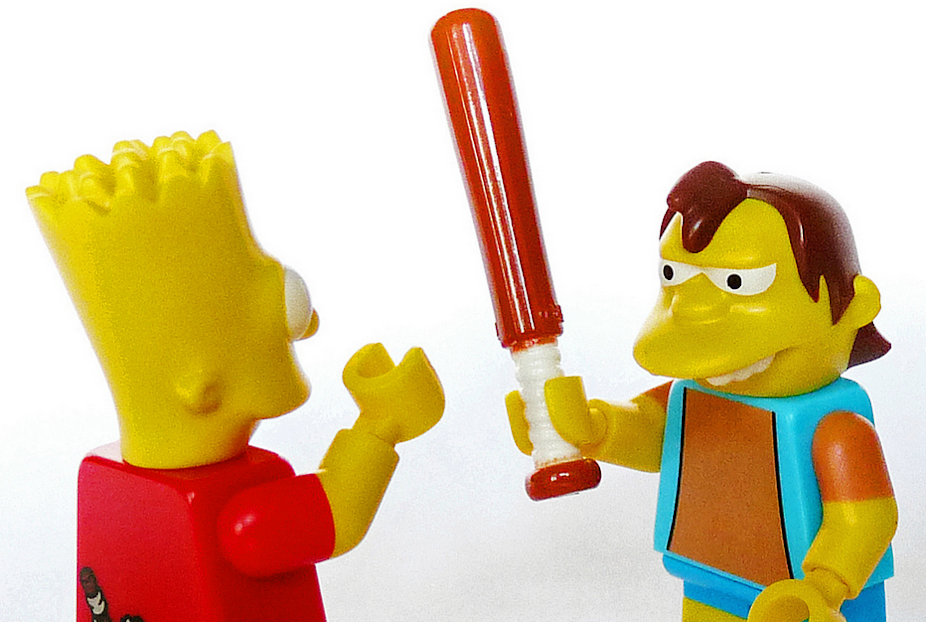Bullying in schools is a subject that is talked about a lot. One of the quieter areas of discussion and research is the experience of parents whose child is responsible for harassing and victimising others. What happens when you’re the parent of Nelson Muntz or “Ja'mie Private School Girl”?
Bullying and schools
A raft of policies have emerged in recent years in response to growing community concerns about the role schools have in preventing, managing and responding to bullying problems. Education departments, such as South Australia and New South Wales, require schools to have anti-bullying policies that outline school procedures for managing bullying, as well as describing programs to support those who are affected by it in some way.

Nevertheless, much of the focus is understandably on the students who are the bullied, rather than on the bullies themselves. Even the national bullying program for schools, teachers, students and parents does not provide specific information for schools about working to support students who are bullying, despite the research suggesting that this needs to happen.
The research also highlights the importance of schools and parents working together to achieve a positive outcome for the student who is bullying.
What can schools do to help parents?
No parent wants to hear the news that their child is bullying other students at school, so the concerns must be raised in a considered way. It’s important the school and parents together consider what issues, either at home or at school, could be contributing to the student’s bullying behaviour.
A plan to manage the bullying behaviour needs to be developed by the school, parents, and student (if appropriate). It must consider any underlying issues the student may be experiencing. The plan should outline the expectations for the student, as well as consequences for both negative and positive choices the student makes.
It should also include steps to support the student to help them understand their bullying, and may include additional support such as access to the school counsellor.
Finally, schools need to be aware of the reluctance of some families to approach the school about such matters, concerned that they may be unfairly or harshly judged by school staff. To alleviate this, schools must make sure the opportunity for discussion and planning happens in an environment and a way that will allow the parents (and student if they are present) to speak and contribute openly.
Parent-child relationships in bully dynamics
What to do when your child is a bully seems to be harder to contemplate than what to do if your child is being bullied. The parental reaction can be similar to that of the first two stages of the commonly known Five Stages of Grief, that of denial and then anger. A typical reaction might be something like this:
No, I can assure you Principal my Jane/John is an angel and does not indulge in that type of behaviour. I am so angry at this accusation that I will withdraw John/Jane from your school.
Research has shown that parents or guardians, usually being the closest person to their son or daughter, may in fact be the last to know or accept this event is happening. A study in Finland from 2009 showed that parents really were the last to know, as the table below shows.

Advice to Parents
The Australian Psychological Society says parents should ask the child how they would feel if they were in the situation of being bullied, and praise the child when s/he plays in a respectful way with others.

The issue can be resolved in a way where negative behaviour is replaced by positive reinforcement. Gradually improvement can take place in most cases where there is an understanding that the child has behaved poorly and that discussion can help improve the situation.
Of course, like many psychological issues, serious family dysfunctions such as the child being affected by negative discipline at home will have a detrimental affect on the child’s ability to understand the harm that bullying can do to another person. The development of empathy is key to the child understanding the harm that bullying can have on the other person.
What do I do?
Most parents will experience a mixture of shock, embarrassment and disbelief about the suggestion their child is bullying others. The urge to defend your child from such accusations should not, however, mean that parents ignore the fact that some kind of problem exists.
It is equally unhelpful to immediately assume that all complaints are objectively accurate and that swift punishment is needed. Instead take the time to talk calmly and privately with your child, discuss the reported events and take advantage of the supports offered by the school, such as counselling and social skill development.
Schools also have a critical role to play here in facilitating interventions appropriate to the severity of the problem. This can range from structured parent conferencing, to referrals made for specialist counselling through to involvement of law enforcement where the immediate safety of a child is of concern. It is not enough to leave these parents on their own to manage a situation that is being experienced in the school setting, an environment beyond their immediate control.


